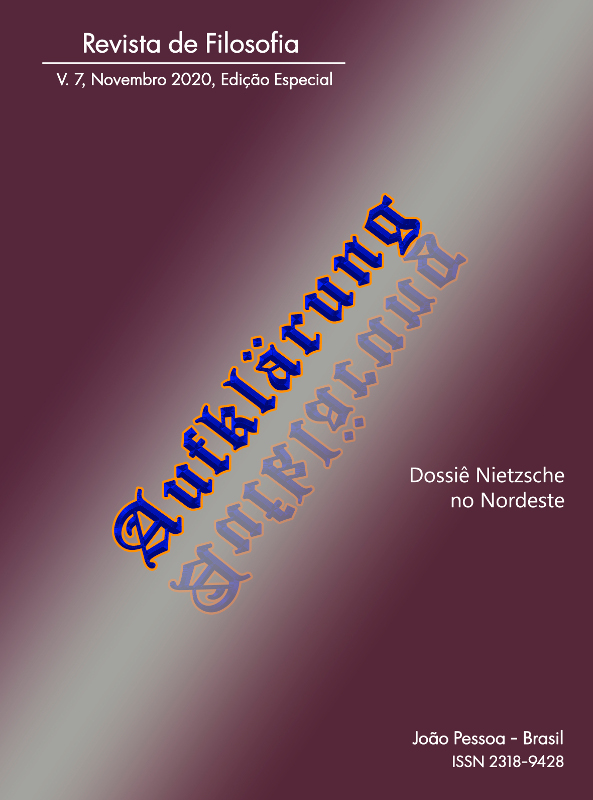The Concept of Bad Consciousness in Nietzsche's Philosophy versus the Concept of Superego in Freud's Metapsychology
DOI:
https://doi.org/10.18012/arf.v7iesp.56771Keywords:
Nietzsche, Freud, Bad Conscience, Superego, RepressionAbstract
This paper aims to compare the reasoning that led to the coining of two close concepts: Bad Consciousness, as described in Friedrich Nietzsche's On the Genealogy of Morality; and Sigmund Freud's Superego, taking into account his work Civilization and Its Discontents (Culture). One of the elements of approximation between the two authors is the following reasoning: on account of an instance outside himself, man would develop an inner tendency toward self-restraint and self-flagellation. This tendency would be a sickening property, which Nietzsche and Freud repel. In Nietzsche, this self-censorship is the bad conscience: a sense of guilt that comes upon men because they want to exert their strength. Instinctual, animalistic, human pleasure, once gagged by the laws of the community, by responsibility, ends up in bad conscience. In Freud, the subject must, by virtue of the benefit of community life, moderate his ambitions for the enjoyment of pleasure. That is, a restraint that was initially external and social, is internalized and becomes part of the mind structure of the subject in question.
Downloads
References
DINIZ, Almachio. O Super-Homem (O fundamento evolucionista do übermensch de Frederich Nietzsche). Cadernos Nietzsche, São Paulo, volume 36, número 2, p. 123-142, Dez. 2015.
FREUD, Sigmund. O Mal-Estar na Civilização (tradução Paulo César de Souza). 1ª Edição. São Paulo: Penguin Classics Companhia das Letras, 2011. 96 páginas.
GARCIA-ROZA, Luiz Alfredo. Freud e o Inconsciente. 24ª Edição. Rio de Janeiro: Zahar, 2009. 240 páginas.
GONÇALVES, Luiz Felipe Xavier. Genealogia do Estado e do Direito em Nietzsche. 20-Fev-2019. 125 f. Dissertação (Mestrado) - Curso de Filosofia, Departamento Filosofia, Universidade Federal de Pernambuco, Recife, 2019.
ITAPARICA, André Luis Mota. “Darwin e Nietzsche: natureza e moralidade”. In: BARRANECHEA, Miguel Angel de; FEITOSA, Charles; PINHEIRO, Paulo; SUAREZ, Rosana. Nietzsche e as ciências. 1ª Edição. Rio de Janeiro: 7 Letras, 2011. 360 páginas.
NIETZSCHE, Friedrich. Genealogia da moral: Uma Polêmica (tradução de Paulo César de Souza). 1ª Edição. São Paulo: Companhia das Letras, 2009. 162 páginas.
Additional Files
Published
How to Cite
Issue
Section
License
Journal general policy
1.This journal works under a Creative Commons License aplied to online journals. That icence can be read in the following link: Creative Commons Attribution 4.0 International (CC BY 4.0).
2.Accordingly to this License, a)the journal declares that authors hold the copyright of their articles without restrictions, and they can archieve them as post-print elsewhere. b)the journal allow the author(s) to retain publishing rights without restrictions.
Metadata Policy for information describing items in the repository
1. Anyone may access the metadata free of charge at anytime.
2.The metadata may be re-used in any medium without prior permission, even commercial purposes provided the OAI Identifier or a link to the original metadata record are given, under the terms of a CC BY license refered for the Journal.







































